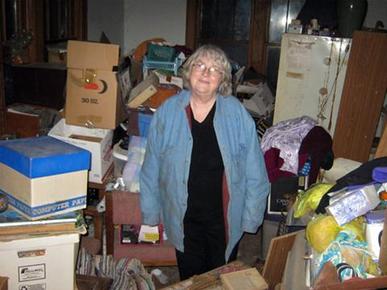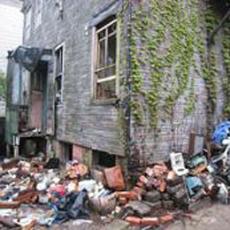
FAITH LAPIDUS: This is SCIENCE IN THE NEWS in VOA Special English. I'm Faith Lapidus.
CHRISTOPHER CRUISE: And I'm Christopher Cruise. On our program this week, we tell about compulsive hoarding syndrome. It is both a mental sickness and a public safety issue.
(MUSIC)
FAITH LAPIDUS: Many people in the United States are looking forward to the return of spring. During this season, millions of Americans do what is known as Spring Cleaning. They open windows in their homes to let in fresh air. They use cleaning products that make their homes smell nice. And some organize their belongings.
Many Americans have a strong desire to clean up their homes. This can also be called removing clutter. Clutter can be described as a disorganized collection of things. To remove clutter means to throw away the things you do not want. Then, you organize the things you have decided to keep.
CHRISTOPHER CRUISE: In recent years, it has become easy to find information on how to attack clutter. There are books, websites and television programs on the subject. Specialty stores sell containers and boxes for storing things around the house.
Some Americans pay people to come to their homes to remove clutter. Such people provide advice on what to keep and what to throw away. They also help with organizing things. However, the services of a professional organizer can be costly. Such services can cost up to 200 dollars an hour.
FAITH LAPIDUS: Some people have serious problems with clutter. They have a mental disorder called compulsive hoarding syndrome. Compulsive hoarding syndrome affects an estimated one million people in the United States.
Compulsive hoarding is commonly connected to obsessive-compulsive disorder, or OCD. This disorder causes people to have ideas that interfere with their daily activities. Such persons act on these ideas, even when they know the resulting actions are not reasonable.
Fear of being dirty may cause persons with OCD to wash their hands again and again. They may inspect things repeatedly, like making sure all electrical devices are turned off.

CHRISTOPHER CRUISE: People with untreated OCD may not be able to control the urge to repeat senseless activities. People with Compulsive Hoarding Syndrome gather many objects and seemingly cannot remove them. Most people would say the objects that hoarders collect are useless or worthless. However, hoarders believe the objects could be useful some day. They may even develop an emotional connection to such things.
Hoarders are afraid to throw away things. At the same time, they continue to bring more and more things into their homes. They may save objects such as newspapers, clothing, and even old food.
FAITH LAPIDUS: Hoarders live with so much clutter that it may endanger their physical health. Dirt, insects and bacteria that form over time can cause sickness.
Safety experts say the homes of hoarders often are unsafe. A room filled with newspapers, for example, can cause floor supports to break down. In many cases, a room is filled from top to bottom with useless things. There is only a small space to walk from one end of the room to the other.
(MUSIC)
CHRISTOPHER CRUISE: One of the most famous hoarding cases involved two brothers in New York City. Homer and Langley Collyer were found dead in their home in 1947. Langley Collyer was buried under what appeared to be a mountain of old newspapers. The weight of the newspapers crushed him. Langley was Homer's caretaker. Medical experts believed Langley had been dead for several days before his brother Homer died of starvation.
Police found the home filled with thousands of unread books, pieces of wood, and skins from large fruits and vegetables. The brothers also saved pipes and very large automobile parts.
FAITH LAPIDUS: Compulsive hoarding can have a severe effect on a family. Family members who share a home with a hoarder cannot understand why their loved one keeps so many useless and sometimes dangerous things. It prevents the family from enjoying their home. Experts say the hoarder should make a greater effort to keep the home clean and organized. However, it is not that simple.
Randy Frost is a psychologist at Smith College in the American state of Massachusetts. He has studied hoarding. Professor Frost says it is more than a mental disorder. He says hoarding is a public health problem.
CHRISTOPHER CRUISE: Severe health risks can result from collecting waste, food or materials that can cause fires. In the United States, hoarding violates laws that were created to protect public safety and property. Some cities have formed groups to deal with the problems caused by hoarding. Each group usually has representatives from one or more government agencies.
Agency officials say they often hear about hoarders from people who live near someone affected with the disorder. Those people no longer want to see broken household objects or old clothing lying on property near their homes.
(MUSIC)
FAITH LAPIDUS: Persons suffering from Compulsive Hoarding Syndrome do not only collect objects. Some collect cats, dogs, birds, snakes or other animals. Most animal hoarders believe they are rescuing the animals to care for them. However, hoarders do not realize when they have too many animals. They are really doing more harm than good. They may not be able to provide health care for the animals. Some animals may not be washed or fed.
Officials have been shocked at the condition of the homes of animal hoarders. Floors were covered with animal wastes. Infectious diseases were a problem. Some animals were found starving, while others had died.
CHRISTOPHER CRUISE: A grand jury in New York recently charged a man and his wife with hoarding 100 cats. The cats clearly had not received good care. Investigators said some of the animals were missing teeth or eyes. Others were suffering from many insect bites and dehydration - a lack of needed fluids in the body. The owners were charged with torturing and injuring animals.
FAITH LAPIDUS: The American public has shown deep interest in the strange behavior of animal hoarders like the people in New York. Several television channels show reality programs about hoarders. Reality programs present events as they happen, such as the rescue of animals from hoarders' homes.
Television cameras capture the sadness of the owners as animal police take away their pets. And the cameras show the struggles of the hoarders and the efforts of people who want to help them.
Gregory Chasson is a mental health expert and professor at Towson University in Maryland. He says the public's interest in hoarding programs comes from most people's own natural human desire to collect things.
The professor says that for most people, this simply means behavior like keeping too many papers or having a little clutter. But he says hoarding becomes a mental health problem when it interferes with normal life.
CHRISTOPHER CRUISE: Professor Chasson says compulsive hoarding is extremely difficult to treat. He says hoarders are less likely than others to recognize that they have a problem. But he suggests that cognitive-behavioral therapy can help. In this method, hoarders work with an expert to understand why they gather and save so many things.
When reasons are found for the hoarding, he says, people can develop a plan for organization. They can learn how to decide what to throw away. They can learn to resist the urge to bring home more things.
FAITH LAPIDUS: Some hoarders improve by meeting with others and talking over their struggles. These group therapy meetings can take place in the hoarders' homes. But the therapy does not always happen in direct meetings. Some meetings for hoarders are held through the Internet. And, some hoarders use their computers to communicate with a supportive person.
A method as easy as taking a picture of the area to be organized before and after the work is done can give hoarders a feeling of progress. With improved decision-making skills and ways of thinking, it is possible for a hoarder to become a former hoarder.
(MUSIC)
CHRISTOPHER CRUISE: This SCIENCE IN THE NEWS was written by Lawan Davis and Jerilyn Watson. June Simms was our producer. I'm Christopher Cruise.
FAITH LAPIDUS: And I'm Faith Lapidus. Visit us at voaspecialenglish.com, where you can find transcripts and MP3s of our reports. Join us again next week for more news about science in Special English on the Voice of America.
(MUSIC)
compulsive hoarding: 强迫症储物
clutter: 杂乱,混乱
obsessive-compulsive disorder: 强迫性精神障碍
Study looks at mental disorders in college-age adults
Octuplets mom 'obsessed with having kids'
India getting nervous over stalled monsoon
(来源:VOA 编辑:Rosy)
关注和订阅


电话:8610-84883645
传真:8610-84883500
Email: languagetips@chinadaily.com.cn